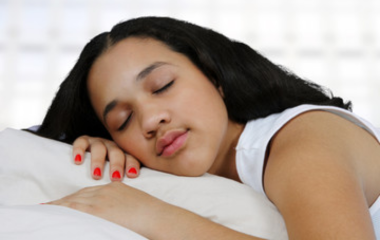The National Healthy Sleep Awareness Project has launched the “Sleep Recharges You” campaign, urging teens to make sleep a top priority. Parents and teachers can play an important role by helping teens to understand the importance of sleep.
The American Academy of Sleep Medicine recommends that teens should sleep 8 to 10 hours each night to promote optimal health. But CDC data show that insufficient sleep is common among teens. About 69 percent of high school students report sleeping 7 hours or less on school nights.
This ongoing sleep loss can hinder teens’ learning ability in the classroom. It also can impair their athletic performance.
Even worse, teens who sleep less than 8 hours on school nights are more likely to make bad choices that put their health at risk. CDC data show that sleepy teens are more likely to:
- Smoke cigarettes or marijuana
- Drink alcohol
- Be sexually active
- Get in fights
High school students who don’t get enough sleep also are more likely to feel sad or hopeless. These mood problems can have devastating consequences. Sleep-deprived high school students are nearly two times more likely to seriously consider attempting suicide.
Failing to get enough sleep also can be a threat to teens’ safety on the road. CDC data show that high school students who sleep less than 8 hours on school nights are more likely to drink and drive. They also are more likely to text while driving. Drivers between the ages of 16 and 24 years also are 80 percent more likely to be in a drowsy driving accident.
As a parent, you should model healthy sleep habits in your home. You also should help create a healthy sleep environment for your teen. Ensure that your teen’s bedroom is free from electronic devices – no TV, computer or video game system.
How early your teen has to wake up for school is a key factor that impacts his or her sleep duration. A natural shift in the timing of the body’s internal “circadian” clock occurs during puberty. As a result, most teens have a biological preference for a late-night bedtime.
A recent CDC analysis found that the average start time of U.S. public high schools was 7:59 a.m. Only 14.4 percent of public high schools started school at 8:30 a.m. or later. Among all states, Louisiana schools reported the earliest average start time of 7:40 a.m. The American Academy of Sleep Medicine encourages parents and local school boards to work together to implement high school start times that allow teens to get at least 8 hours of nightly sleep.
Learn more in these five sleep tips for parents of tired teens. Let’s work together to help teens recharge with sleep tonight – and every night.




